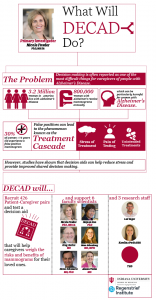INDIANAPOLIS — Family caregivers of individuals who have cognitive disorders are faced with complex and stressful challenges for which they are often unprepared and unsupported.
Health services researcher Nicole Fowler, PhD, MHSA of the Indiana University Center Aging Research, Regenstrief Institute and IU Center for Health Innovation and Implementation Science, and colleagues have received grants from the National Institute on Aging and the Department of Defense totaling nearly $3 million to fund two novel studies focusing on helping family caregivers of individuals with Alzheimer’s disease (AD) and related dementias or traumatic brain injury (TBI).

A $2.2 million, five-year NIA award funds the randomized control Decisions about Cancer Screening in Alzheimer’s Disease study, known as DECAD, to investigate if an evidence-based mammography screening decision aid can improve the quality of medical decision making among caregivers by lowering their decisional conflict and increasing their confidence in making mammography decisions for older women with AD.
“Family caregivers are often the ones making tough decisions and facilitating medical care for their loved ones with Alzheimer’s disease,” said Dr. Fowler. They struggle with decisions about care, especially those that they are not sure will improve their loved ones’ quality of life and may be burdensome. For example, imagine you are a woman with Alzheimer’s disease being taken out of your familiar surroundings to get a mammogram and you don’t really know or understand what is going on, what is being done to your body; then imagine how difficult it can be for the caregiver to make the decision to take their confused family member to the imaging facility and keep them calm and comfortable.”
National guidelines on mammography screening in older women vary and some address the need to tailor guidelines for women with serious, life-limiting illnesses such as Alzheimer’s disease. It is estimated that over 800,000 older women with AD receive screening mammograms annually in the US.
“Additionally findings from this study will help us understand the implications of undergoing follow-up tests and treatment for these women and if they are a significantly greater burden for older women with dementia than those who are not cognitively impaired,” Dr. Fowler said.
To determine if the decision-making quality of caregivers can be improved, half of the 426 caregivers enrolled in the DECAD study will be randomized to receive an evidence-based decision aid and followed for 24 months. The decision aid was developed by Dr. Fowler and colleagues with the support of a Regenstrief Foundation innovation award.
The second new grant to Dr. Fowler, a DoD award of $626,283, supports the first study of a comprehensive collaborative care program for veterans with TBI or AD and their caregivers designed to be scalable and embedded into the VA healthcare system.
Study participants will be enrolled in Aging Brain Care (ABC for short) ANSWERS. This study builds upon the ABC collaborative care model, developed by IU Center for Aging Research. ABC ANSWERS expands the bundle of ABC services to veterans with traumatic brain injuries and incorporates strength-based educational and skills training for veterans and their caregivers. A key aspect of the intervention builds upon techniques that currently work for veterans and their caregiver partners adding nuances to compensate for cognitive and behavior changes due to memory loss and other symptoms of dementia or TBI.
Since 2000, over 350,000 veterans have been diagnosed with TBI, putting them at high risk for dementia. Nationwide more than 564,000 veterans have a diagnosis of AD.
The ABC model has been shown to improve care and outcomes for patients and caregivers while decreasing ER visits and hospitalizations for older adults with dementia and ICU survivors, and is currently being studied in trauma victims.
“As are those who care for family members with AD, caregivers of individuals with TBI are critical to the quality of life of the care recipients,” said Dr. Fowler. “However, these caregivers experience high rates of depression and burden as well as social isolation, financial hardship and poor physical health. There is a great and growing need to address these issues.”
The physical, psychological and cognitive issues of the veteran with TBI or dementia and his or her caregiver participating in ABC ANSWERS will be addressed. Study participants will receive comprehensive collaborative care in partnership with their VA primary care team and a series of nine joint sessions with a trained interventionist that will focus on areas known to lead to stress between patient and caregiver, including communication and understanding behaviors of individuals with brain injuries or cognitive impairment.
The study, which will measure the effectiveness of ABC ANSWERS, will initially enroll veterans and caregivers seen at the Richard L. Roudebush VA Medical Center in Indianapolis and will then extend to community-based outpatient clinics (CBOCs) throughout Indiana. A total of 200 patient-caregiver pairs will participate.
“We hope to develop evidence-based information on how to improve VA clinicians’ ability to provide high quality primary care to veterans with AD and TBI by tailoring medical care to match the specific needs of veterans and their caregivers,” Dr. Fowler said.
Media contact:
Cindy Fox Aisen
Regenstrief Institute
caisen@iupui.edu
317-843-2275








